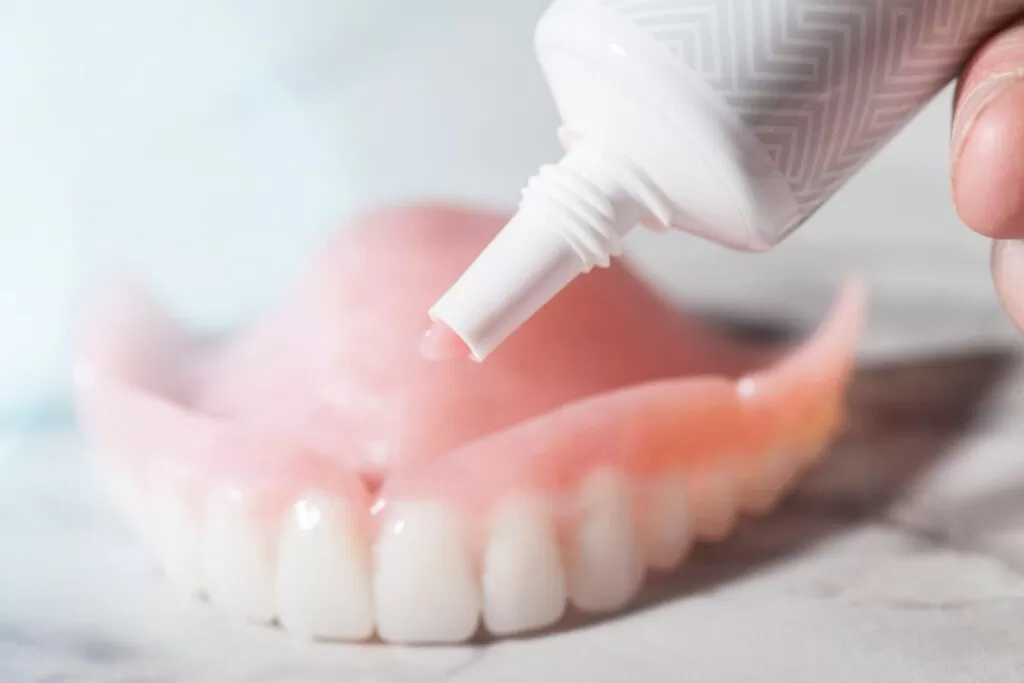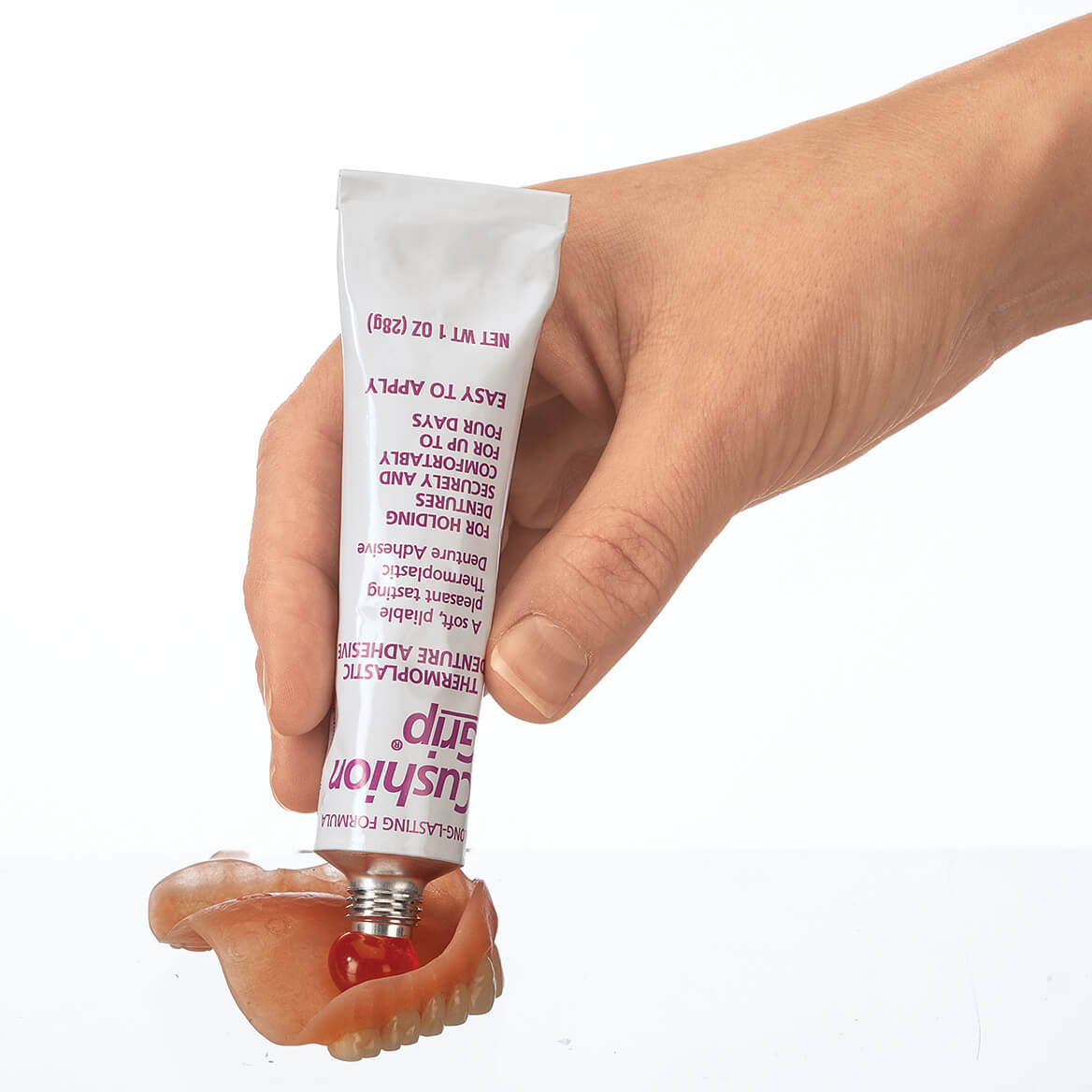If you have chosen dentures to replace missing teeth, they must fit well in your mouth. The most common method of accomplishing this is using denture adhesives. Patients are often confused regarding the role of adhesives in terms of denture care, and Smile Plus Dentistry routinely instructs their patients on their proper use. This guide looks at the value, classifications, and advice on how to use denture adhesives to ensure that patients find comfort and confidence while wearing them every day.
Why Use Denture Adhesives?
Denture adhesives are a combination of dentures with implants and help patients who have loose or ill-fitting dentures, as well as people whose gum edges have atrophied due to bone loss. For those who like their denture to be in place when eating, speaking, and laughing, adhesives can also provide an added level of confidence. While properly fitted dentures should naturally have a degree of pressure that keeps them in place, adhesives give you an added layer of security and comfort when doing things like eating or speaking throughout your daily activities.
Benefits of Using Denture Adhesives
Denture adhesives improve maintenance, reducing the awkward slipping and loose fitting that can occur with other dentures. This increased security gives the wearer confidence to interview, eat, or smile throughout their day without focusing on how loose and shifty their dentures are. Adhesives also decrease the rubbing between dentures and gums, thus minimizing irritation or sores. In addition to stability, the adhesives enhance chewing efficacy by preventing dentures from falling out while consuming some sticky meals. They also offer improved comfort by filling in spaces and making the dentures fit more properly against the gums.
Types of Denture Adhesives
Denture adhesive comes in several styles, and the best type for you can vary depending on your personal preferences and lifestyle. When choosing an adhesive for your dentures, you probably have to take into account the strength of hold, ease of use, and whether or not it addresses any specific dental needs. Let’s jump in and break down the common options:
-
Creams and Pastes
These are some of the most commonly used denture adhesives. It is in the form of a paste that users put directly on the underside of their denture to stick it inside their mouth. If you use creams, they will secure it properly throughout the day, and all these are quick to apply.
-
Powders
This denture adhesive powder is scattered onto moist dentures. It creates a minimal, uniform layer so that the gums can bond to the plate. Although they offer a lighter hold than creams, they have less mess for some of our customers.
-
Strips and Pads
Adhesive strips or pads are individually shaped pieces that you apply directly to the surface of your denture. They are economical and without mess, which makes them preferable for those who like ease in a very fast procedure. Plus, they mostly give you even coverage that improves comfort.
-
Zinc-Free Adhesives
Certain denture adhesives contain zinc in potentially harmful levels. Zinc-free sprays are on the market, designed for those who might have hesitations about long-term zinc exposure.
How to Apply Denture Adhesive Correctly
Proper denture adhesive use is important if we want a good fit. Clean and dry your dentures completely, as the adhesive will not stick to wet or dirty surfaces. We only require a light amount of adhesive, as overdoing it can result in excess material coming out of it and make it feel clumpy.
After it is applied, press your dentures into place and hold them so the adhesive can bond to both surfaces. Once the glue is applied, wait a few minutes for it to dry completely, and then try not to eat or drink anything. At night, when you go to sleep, take your dentures out and let those gums relax.
Clean your dentures and gums thoroughly, removing any extra adhesive, before storing them in water at night or whenever you don’t want to use them. This routine can provide you with the best and most comfortable experience with your dentures.
How to Remove Denture Adhesive
To simplify this task, try the following steps for removing denture adhesive. Soaking your dentures in warm water will help to release the adhesive, making them easier to remove. If the adhesive still leaves some rest, you can clean it by gently brushing over its surface with a soft-bristle toothbrush. Finally, get a soft toothbrush and massage away the last of any adhesive on your gums. This technique ensures that your dentures are removed gently and efficiently, helping to maintain both the fit of your gums and overall hygiene.
When to Avoid Denture Adhesives
Although denture adhesives hold the false teeth in place, they are not always suitable. Most people use a certain type of adhesive to keep their dentures in place, but those who have problems with their dentures and can’t use them without any struggle should seek the help of a dentist, especially if they are ill-fitting or uncomfortable.
Do not use any adhesives if your gums are sore, reddened, or bleeding, as they could worsen the condition. Overuse of adhesive can also result in buildup, which will prevent your dentures from fitting correctly. It is very important to always use the proper amount of adhesive for your denture, as it will keep you comfortable and help support its function.
Tips for Maintaining Dentures
Steps for proper denture care are broken down into a few essential steps:
- Always start by keeping dentures clean daily using a soft brush and non-abrasive cleaner to keep bacteria away or prevent discoloration.
- Hot water can change the shape of the denture material.
- During the night, dentures must be soaked in water or a denture solution to preserve their shape and moisture.
- Always remember to visit your dentist at least twice a year so that they can evaluate the status of your gums and check and adjust the fit of your dentures if necessary.
Denture Adhesives and Implant-Supported Dentures
Patients who are interested in or currently wear implant-supported dentures due to their direct attachment do not need to use adhesives, as is sometimes common with traditional dentures. In cases where you are choosing a mixture design that involves both implants and adhesives, it is essential to consult with your dentist. This ensures that the adhesive you select is not only straightforward but also does not unpleasantly impact your implants or interfere with their usage.
Conclusion
Denture adhesives are a fantastic way to boost the comfort, function, and confidence of denture wearers. With the proper selection and correct application of denture adhesives, as well as good care for your gums and dentures, you secure yourself an appearance that is truly just dazzling. How well you care for them and the products they are made from will contribute to how long they should last and be comfortable. If you are not sure which adhesive is suitable or need any help regarding denture care, Smile Plus Dentistry can help! Contact our team of dental professionals for personalized suggestions and a winning smile today! We are always here to help your pearls shine.



No Comments